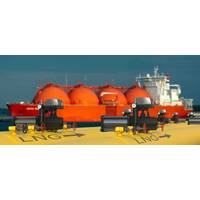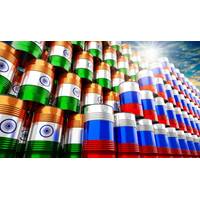Cheniere Raises Share Repurchase Target After Q4 Profit Doubles

Cheniere Energy said its fourth-quarter profit more than doubled on strong liquefied natural gas (LNG) demand and the company raised its share repurchase target to more than $10 billion through 2030.Shares of the largest LNG producer in the U.S. were up 1.2% at about $223 in premarket trading on Thursday.The U.S. is the world's largest LNG exporter and had shipped 15 billion cubic feet per day (bcfpd) of the supercooled fuel last year, according to the U.S.
Cheniere increases buyback plan above $10 billion due to strong LNG demand
Cheniere Energy reported that its fourth-quarter profits more than doubled due to a?strong demand for liquefied gas (LNG). The company also raised its share repurchase goal from $10 billion until?2030. The largest LNG producer in the United States, the shares of this company are up 1.2% at $223. In premarket trading, shares of the largest?LNG producer in the?U.S. were up about 1.2% to $223. According to the U.S. Energy Information Administration, the U.S. was the largest LNG exporter in the world last year. It shipped 15 billion cubic foot per day (bcfpd), an increase of 26% from 2024.
Romgaz CEO: If acquisition proceeds, Romgaz will need more funding to complete gas project.
If the acquisition of a ailing fertilizer producer by Romgaz this year goes through, it may have to use additional funding to pay for its portion of offshore project Neptun Deep. Romgaz and OMV Petrom have teamed up to develop Neptun Deep, one of Europe's largest natural gas reserves. Both companies will share the estimated cost of 4 billion?euros ($4.72billion) for this project. Romgaz issuing euro-denominated bonds since 2024 via a programme of euro medium-term notes to finance its part of the project. However, it may need to raise more funds if the Azomures purchase goes ahead this year.
Golden Pass is moving closer to producing its first LNG by increasing natural gas flow into the facility
LSEG data show that Golden Pass, a joint venture between Exxon Mobil, QatarEnergy and Exxon Mobil, has pulled in more than 300 million cubic feet on Wednesday, bringing it closer to producing its first LNG. The '18 million metric tons per year project in Texas will be one of the biggest U.S. export facilities of super-cooled gas and help the United States maintain its position as the top exporter. Exxon CEO Darren Woods stated on January 30 that he expects the plant to begin producing LNG in March. This marks an important milestone for the project.
Caturus signs a 20-year LNG Supply Deal with Saudi Aramco
U.S. Gas Producer 'Caturus' said on Friday that its unit, Commonwealth LNG, had signed a twenty-year agreement with Saudi Aramco to supply 1,000,000 tonne per year of lNG from?its proposed Louisiana Export Project. The U.S. is working hard to surpass Qatar and Australia as the largest LNG exporter in the world. Since President Donald Trump lifted the pause on export permits last summer, commercial activity in the LNG sector has risen. Caturus CEO David Lawler said, "This agreement highlights the strong demand for U.S. LNG developers usually reach a final decision on a project once they have secured sufficient supply deals to get the financing needed for construction.
EEX invites comments on the extension of trading hours for benchmark gas contracts
The CEO of Deutsche Boerse's EEX (Europe's largest electricity and gas 'exchange) said that the company is currently in discussions with market participants about whether to extend trading hours on Europe's main gas benchmark. EEX - peer Intercontinental Exchange - announced last month that it would extend the daily trading hours of European gas and electricity contracts from 0800 CET until 1800 CET on April 13 to 0150 CET (2300 CET) (0050 GMT-2200 GMT). Peter Reitz, CEO of EEX, said that the company is "listening closely" to what the market participants have to say about the issue, and added that the feedback has been mixed. DOES THE MARKET WANT IT?
Trinidad's Atlantic LNG will shut down Train 4 to perform major maintenance
Three people familiar with the plan said that Trinidad and Tobago’s flagship 'Atlantic LNG' plans to close its 6 million metric ton per annum Train 4 in May and/or June for maintenance and repairs. Atlantic LNG is owned by Shell, BP and Trinidad's National Gas Company. Each company holds a 45% share. According to documents from the company, this facility will account for?roughly 15% of BP’s global LNG production in 2025 and 10% of Shell’s LNG output. People told us that the maintenance and repairs will begin on May 4, and last between 45-50 days. During this time, Atlantic will continue exporting LNG from Trains 2 &?3, with a combined 6 mtpa capacity.
Trinidad's Atlantic LNG Shuts Down Train 4 for Maintenance

Trinidad and Tobago's flagship Atlantic LNG plans to shut its 6 million metric ton per annum Train 4 for up to 50 days in May and June for extensive maintenance and repairs, three people with knowledge of the plan told Reuters.Atlantic LNG is majority owned by Shell and BP - each with a 45% stake - while Trinidad's National Gas Company holds 10%. The facility accounted for roughly 15% of BP's total global LNG production and 10% of Shell's LNG output in 2025, according to company documents.The maintenance and repairs, called a turnaround, will commence on May 4 and will run for between 45 and 50 days…
Petronas signs a 20-year LNG Supply Deal with QatarEnergy
QatarEnergy has agreed to supply Petronas with 2 million metric tonnes of LNG per year in a deal lasting 20 years. This will help meet the country's increasing gas demand despite its dwindling gas reserves. Qatar signed a 27-year LNG deal with Japan in the last week, and this deal was the first long-term LNG supply agreement between the two nations. Petroliam Nasional (Petronas) is pursuing new investments in natural gas fields abroad, and is seeking partnerships with foreign companies to increase extraction. It also seeks LNG import deals due to the falling reserves of local reserves.
Commonwealth LNG signs 20-year supply agreement with Mercuria in response to US LNG export growth
Commonwealth LNG announced on Tuesday that it had signed a sale-and-purchase agreement for 20 years to supply Mercuria 1 million metric tonnes of liquefied gas per year. The deal stipulates that Mercuria would provide Commonwealth with the equivalent amount of natural gas (estimated at 133 millions cubic feet per day) and Commonwealth will convert it to LNG, which Mercuria can then purchase. Commonwealth, a company owned by energy asset management firm Kimmeridge and majority-owned by Commonwealth, is attempting to build America's first integrated export facility for LNG. Kimmeridge will provide gas from Eagle Ford shale to the plant.
Sources say that Malaysia's Petronas is set to sign a deal for LNG supply with QatarEnergy.
Two sources familiar with the matter said that Malaysia's state-owned company Petronas was set to sign a deal with QatarEnergy for the supply of liquefied gas. The southeast Asian nation is seeking more supplies of the super-cooled fuel. One of the sources said that Petroliam Nasional or Petronas will sign a deal for LNG up to 2,000,000 metric tons annually. According to Kpler data, Qatar was the second largest LNG exporter in the world after the United States. It shipped out 81.07 millions tons of fuel last year. QatarEnergy has signed a huge LNG deal with Japan’s Jera. The massive 'North Field expansion project' will produce the first LNG in 2026, during the second half.
Grain futures rise as gold and commodities stabilize, while soybeans continue to climb.
Chicago soybean futures rose on Tuesday as traders struggled with teetering commodity markets and rising gold prices. Wheat and corn also traded higher. As of 0453 GMT, the most active soybean contract on Chicago?Board?of Trade was up 0.2% to $10.62-3/4 a Bushel. CBOT corn was up 0.3% and wheat rose 0.3%. The rise in grain and soybean prices is related to the recovery of gold and silver. A sharp fall in the price of gold and silver has recently caused a pullback on the commodities market, according to a Shanghai analyst who requested anonymity.
The US LNG production was cut in January by the winter freeze; imports from Trinidad filled the gap.
LSEG's preliminary data shows that exports of liquefied gas from the U.S. in January fell to 11.3 million metric tons, down from December’s record of 11.5 MT. A winter freeze in late-January shut some plants while lowering output at others. On January 26, gas flows into U.S. liquefied natural gas plants reached a record low. Freeport LNG, the country's third largest LNG exporter, was partially offline during the freezing. Kinder Morgan's Elba Island plant in Georgia, which stopped taking in feedgas in the week before the freeze, imported LNG from Trinidad and Tobago. In the U.S., spot gas prices rose to record highs during the last week in January.
EUROPE GAS-European plunge on milder forecasts, U.S.-Iran diplomacy

Dutch and British wholesale price fell to a two-week low on Monday as the forecasts cooled down and on hopes tensions between Iran and the United States would ease. The Dutch benchmark front month?contract?" at the TTF hub fell 4.92 euros to 34.73 euros per Megawatt Hour (MWh) or $12.06/mmBtu by 0904 GMT. This was its lowest level since January 19. The contract for April fell from 32.50 Euros/MWh to 2.90 Euros. Gas prices for the next week dropped 10.50 cents to 92.00 pence per therm. Analysts at Mind Energy say that prices opened down due to a combination of milder weather predictions over the weekend and easing tensions between the US and Iran.
EUROPE GAS: Prices firm on LNG storage and concerns
The prices of Dutch and British gas contracts were mostly firmer on Friday. This was due to low storage levels and the cold weather that has been continuing. Also, there are concerns about Iran and its geopolitical implications for liquefied gas shipments. LSEG data show that the January contract?at TTF hub?was up 0.48 euros at 40.45 'euros?per MWh on its last trading day, or $14.12/mmBtu by 0947 GMT. However, the main focus is now on the March contract which has gained 0.47 euros to 38.85 Euro/MWh. The Dutch day-ahead contracts was down by 0.06 euros at 40.35 Euro/MWh. The British gas day-ahead price rose by 1.57 pence, to 103.57 p/therm.
Trinidad Minister: BP and Shell are seeking US licensing for shared gas fields with Venezuela.
Shell and BP seek?U.S. Shell and BP are seeking?U.S. Trinidad is Latin America’s largest liquefied gas exporter, and also one of the largest exporters in the world of ammonia and methane. However, the Caribbean island is aiming to develop offshore oil and gas fields near the border with Venezuela to secure its supply and counteract the declining reserves. In recent years, despite frequent U.S. changes in policy towards Venezuela, its gas projects have made slow progress. Venezuela, under the leadership of President Nicolas Maduro, suspended its energy cooperation with Trinidad and?Tobago in 2013, including joint natural-gas projects that were being planned. The U.S.
Shipping data shows that Indian diesel exports to West Africa have increased as a result of the EU's ban on Russian crude-derived fuel.
Shipping data from Kpler & Vortexa revealed that India stopped exporting Diesel to the European Union in this month because of the EU's 'ban' on fuels derived from Russian crude. Turkey's exports of diesel to the EU have slowed down over the past few months. These developments show that the EU's policy to punish Russia for its full-scale invasion in Ukraine 2022 is causing a reordering of oil flows between continents. This forces India's refineries to find new markets, and disrupts Turkey's lucrative fuel trade with the EU. Clare Morris, an analyst with Energy Aspects…
Indian Diesel Exports to West Africa Jump as EU Bans Russian Derived Fuel

India stopped exporting diesel to the European Union this month due to the European Union's ban on fuel derived from Russian crude and instead sent a record amount to West Africa, shipping data from Kpler and Vortexa showed, while Turkey's diesel exports to the EU slowed in recent months.The developments highlight that the EU policy, aimed at punishing Russia over its 2022 full-scale invasion of Ukraine, is prompting a further reordering of intercontinental oil flows, forcing India’s oil refineries to seek new markets and disrupting Turkey's lucrative…
Overview of Iran's major gas fields and oil infrastructure
After a wave anti-government protests, the US is heading to Iran and renewing warnings against Tehran restarting its nuclear programme or killing protesters. Tehran accuses Washington of fomenting turmoil. A major increase in prices could endanger key energy infrastructure, and add uncertainty to the oil and gas market. Here are some facts about Iran's energy sector, its exports and the impact of?Western sanctions. Iran produces natural gases from the South Pars offshore gas field. This gas field makes up about a third the world's biggest reservoir of natural natural gas. Iran shares the reservoir field with Qatar, a major exporter. Qatar calls their field North Dome.
ContourGlobal, owned by KKR, enters Greece through solar and battery acquisitions
KKR's energy group ContourGlobal announced on Friday that it has entered the Greek renewables markets?with a portfolio of solar plants? and 500 megawatts of?battery -energy storage? projects. The agreement includes 26 solar plants that will generate approximately 51 gigawatt-hours (GWh) of electricity per year, enough to power 15,000 Greek homes for an entire year. Quest Energy, part of Quest Holdings, owned the assets. ContourGlobal announced that it also acquired full ownership of six battery storage projects via two transactions with Spain’s FRV, and Greek developer Zephiros. The first 100MW of storage capacity will be ready by the start of next year.